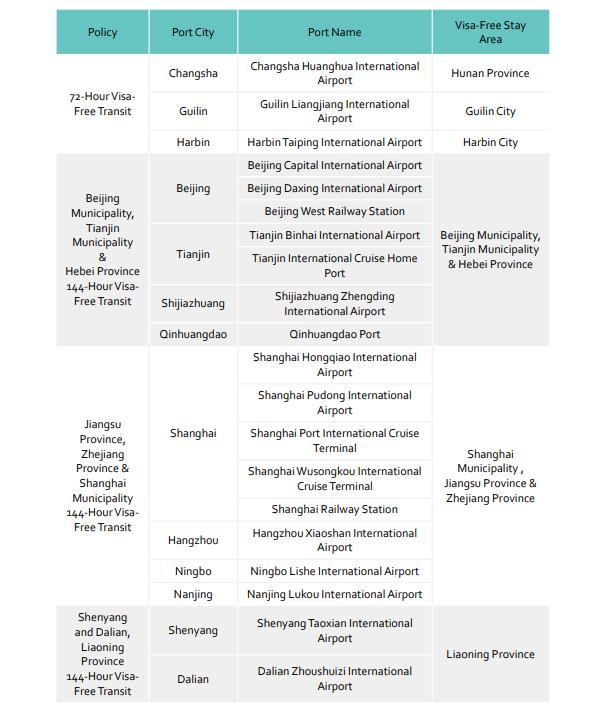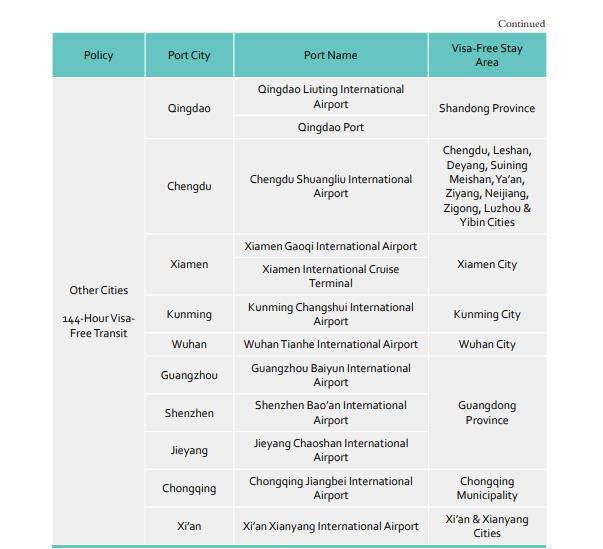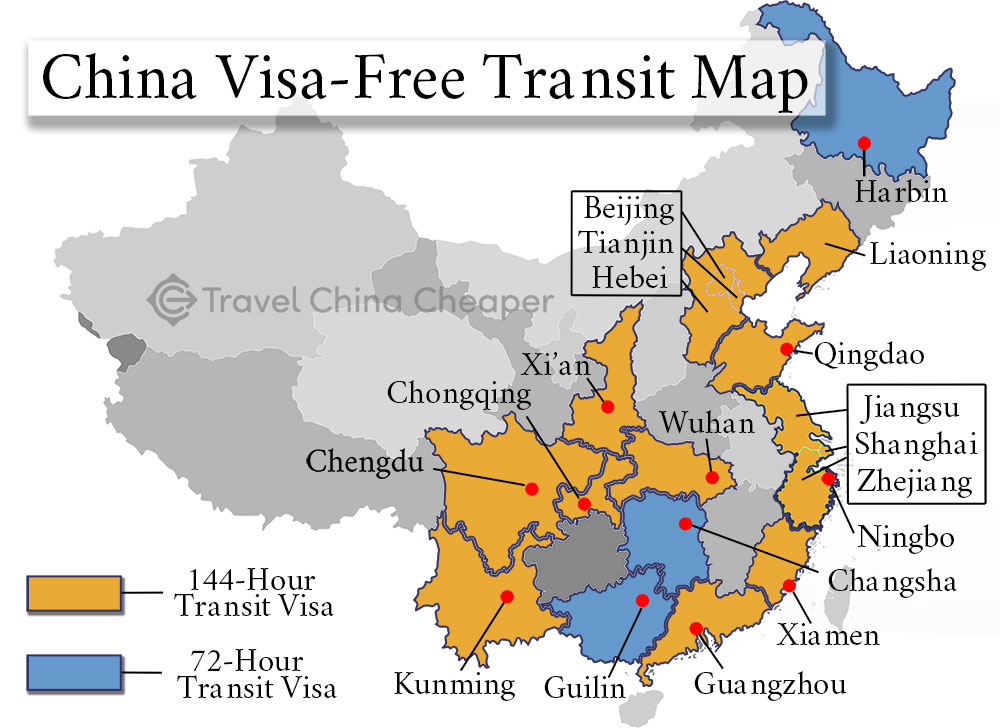Official Interpretation of the 144-Hour Visa-Exemption Transit Policy (2023)
If anyone wishes to visit China without having to apply (and pay!) for an extended visa, then China’s visa-free transit may be a great option. The guidelines are fairly straightforward and simple as long as one plans ahead and provides the required documents. This guide will walk through the updated policy as of Feb 7, 2023.
Which Countries & Nationalities Qualify for China Visa-Free Transit?
The following 53 countries are eligible for the 144-hour visa-free transit visa:
- European countries: Russia, the United Kingdom, Ireland, Cyprus, Bulgaria, Romania, Ukraine, Serbia, Croatia, Bosnia-Herzegovina, Montenegro, Macedonia (FYROM), Albania, Belarus, Monaco.
- American countries: United States, Canada, Brazil, Mexico, Argentina, Chile.
- Asian countries: Korea, Japan, Singapore, Brunei, United Arab Emirates, Qatar.
- Schengen Agreement countries: Austria, Belgium, Czech Republic, Denmark, Estonia, Finland, France, Germany, Greece, Hungary, Iceland, Italy, Latvia, Lithuania, Luxembourg, Malta, Netherlands, Poland, Portugal, Slovakia, Slovenia, Spain, Sweden, Switzerland.
- Oceania countries: New Zealand and Australia.
Which Cities Offer Visa-Free Transit in China?
It’s important to understand the difference between the ports of entry and the regions of movement. In order to stay within the policy guidelines, all travelers MUST arrive and depart directly through one of the following cities via airport, seaport or train station if applicable:
Beijing, Shanghai – 144-hour visa-free by air, sea or train;
Tianjin, Xiamen, Qingdao – 144-hour visa-free by air or sea;
Qinghuangdao – 144-hour transit visa via sea port only;
Guangzhou, Xian, Chongqing, Ningbo, Hangzhou, Nanjing, Shijiazhuang, Qinghuangdao, Dalian, Shenyang, Kunming, Chengdu, Wuhan – 144-hour visa-free via airport only;
Harbin, Changsha, Guilin – 72-hour visa-free service;
Once entered through one of the ports of entry, visitors must remain within the specified regions for each port that include:
Beijing, Tianjin, Hebei (Qinghuangdao, Shijiazhuang): Travelers entering each of these ports here can move freely among these three regions.
Shanghai, Jiangsu, Zhejiang: Travelers entering each of these ports may move freely within these provinces.
Guangzhou, Chengdu, Xi’an, Kunming, Wuhan, Chongqing, Changsha, Xiamen, Guilin, Harbin, Qingdao: Movement restricted to each of these city’s respective provinces (i.e. entering Chengdu gives you access to travel throughout Sichuan, entering Kunming gives you access to Yunnan, etc.).



Rules & Restrictions for China’s Visa-Free Transit
An applicant for 144-hour visa-exemption transit needs to possess a valid passport or other valid international travel documents and an onward air / vessel / train ticket to a third country (region) with confirmed date and seat within 144-hours (6 days) upon arrival, fill out an arrival card for temporary entry foreigners, and be interviewed by the immigration inspection authority. The following types of foreign nationals will not be issued a temporary entry permit:
- Those who are inadmissible to China in accordance with relevant laws and administrative regulations;
- Those whose international travel documents are valid for less than 3 months at the time of application, or those who possess international travel documents containing refusal stamps affixed by Chinese visa issuing authorities;
- Those who have records of illegal entry or exit, illegal stay or residence, or illegal employment in China in the past 5 years;
- Those who have seriously violated the regulation of registering their addresses for temporary residence in China with the public security bureaus in the past 2 years.
In addition, foreign crew members aboard internationally sailing vessels and their accompanying family members are not eligible for this policy.
Foreign nationals, during their visa-exemption transit, must abide by Chinese laws and regulations. They must not leave the specified area of stay or overstay the visa-exemption period. In the first 24 hours of entry, foreign nationals themselves should register their residence addresses with the local public security bureaus or foreigner service stations, or those who provide the foreign nationals with residence can complete the registration on their behalf. For foreign nationals who dwell at a hotel, the hotel has the obligation to register residence for them. In case of force majeure which necessitates a longer period of stay than 144 hours within the visa-exemption area, they need to lodge an application to the exit and entry administration department of a public security bureau for corresponding stay or residence documents.
The following acts will be punishable by law by the immigration inspection authority or local public security authority:
- traveling beyond the specified areas of stay
- overstaying the visa-exemption transit period
- departing from unspecified ports
- failing to register residence information
Frequently Asked Questions
How is the duration of the 144-hour visa-free transit policy calculated?
The duration of stay as referred to in the 144-hour visa-free transit policy will begin from 00:00 o'clock the following day, after entry in any relevant port mentioned above. For example, in accordance with the 144-hour visa-free transit policy, from 00:00 o'clock the following day after entry in Beijing, the traveller will be allowed to stay for six days at most in the area of Beijing, Tianjin and Hebei without entry visa.
If visitors are unable to depart on time due to unavoidable reasons, such as flight cancellation or treatment of sudden disease, they need to apply for a visa from Municipal Public Security Bureau (PSB).
If a citizen from one of the 53 eligible countries for the 144-hour visa-free transit policy does not hold a valid connecting travel ticket to a third country; can he/she apply for the 144-hour visa-free transit?
According to the regulations pertaining to the 144-hour visa-free transit policy, any applicant must hold a valid connecting visitor tickets for travel, with confirmed seat and departure time within 144 hours, or he/ she must possess relevant supporting documents. The applicant must have these documentations before applying for the144-hour visa-free transit.
If citizens from any of the 53 designated countries arrive in those specific regions mentioned above with a valid ticket for travel to their country of origin, with a confirmed seat and with a departure time within 144 hours, would he/she be eligible for the 144-hour visa-free transit policy?
The policy applies for 144-hour visa-free transit rather than visa-free entry. Therefore, the applicant should transit to a third country or region. Visitors returning to their country of origin would not be eligible for this policy.
For example:
USA - Shanghai - Russia is available to apply for the 144-hour transit visa in shanghai.
USA - Singapore - Shanghai - Russia is available to apply for the 144-hour transit visa in shanghai.
USA - Shanghai – USA is not available to apply for the 144-hour transit visa in shanghai.
Can I enter China in one city (for example: Shanghai) and apply the transit visa, then leave China from another city (for example: Hangzhou) in the same 144-hour visa-free transit region?
Yes, if visitors have applied the 144-hour transit visa in the specific administrative precincts, they can arrive in one city and leave from another one which these two cities are both in the same region.
Can I enter China in one city (for example: Shanghai) and apply the transit visa, then leave China from another city (for example: Beijing) which is in different 144-hour visa-free transit region?
No, if visitors have applied the 144-hour transit visa in the specific administrative precincts, they will not be allowed to travel beyond this region. Any other city outside this specific area is not available to travel to.
What kind of punishment will be imposed on those who have successfully applied for and received the 144-hour visa-free transit but stayed in China for more than 144 hours?
According to the relevant regulations of the Exit and Entry Administration Law of the People's Republic of China, individuals who do not hold a valid Chinese passport and are suspected of illegal residence in China will be warned. In case of gross violation, the offender will be fined RMB500 per day for illegal residence, not exceeding RMB10,000 in total, or he/she will be detained for 5-10 days. Anyone who violates the relevant laws and regulations for the 144-hour visa-free transit policy may not be accepted for future applications for visa-free transit.
Edited by Travel China Cheaper
